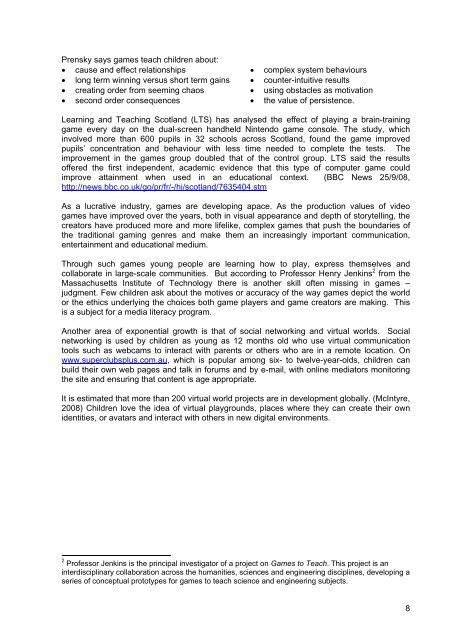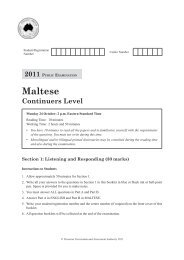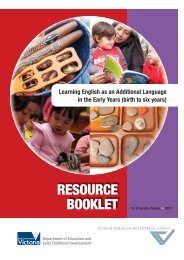television, digital media and children's learning - Victorian ...
television, digital media and children's learning - Victorian ...
television, digital media and children's learning - Victorian ...
You also want an ePaper? Increase the reach of your titles
YUMPU automatically turns print PDFs into web optimized ePapers that Google loves.
Prensky says games teach children about:<br />
• cause <strong>and</strong> effect relationships • complex system behaviours<br />
• long term winning versus short term gains • counter-intuitive results<br />
• creating order from seeming chaos • using obstacles as motivation<br />
• second order consequences • the value of persistence.<br />
Learning <strong>and</strong> Teaching Scotl<strong>and</strong> (LTS) has analysed the effect of playing a brain-training<br />
game every day on the dual-screen h<strong>and</strong>held Nintendo game console. The study, which<br />
involved more than 600 pupils in 32 schools across Scotl<strong>and</strong>, found the game improved<br />
pupils’ concentration <strong>and</strong> behaviour with less time needed to complete the tests. The<br />
improvement in the games group doubled that of the control group. LTS said the results<br />
offered the first independent, academic evidence that this type of computer game could<br />
improve attainment when used in an educational context. (BBC News 25/9/08,<br />
http://news.bbc.co.uk/go/pr/fr/-/hi/scotl<strong>and</strong>/7635404.stm<br />
As a lucrative industry, games are developing apace. As the production values of video<br />
games have improved over the years, both in visual appearance <strong>and</strong> depth of storytelling, the<br />
creators have produced more <strong>and</strong> more lifelike, complex games that push the boundaries of<br />
the traditional gaming genres <strong>and</strong> make them an increasingly important communication,<br />
entertainment <strong>and</strong> educational medium.<br />
Through such games young people are <strong>learning</strong> how to play, express themselves <strong>and</strong><br />
collaborate in large-scale communities. But according to Professor Henry Jenkins 2 from the<br />
Massachusetts Institute of Technology there is another skill often missing in games –<br />
judgment. Few children ask about the motives or accuracy of the way games depict the world<br />
or the ethics underlying the choices both game players <strong>and</strong> game creators are making. This<br />
is a subject for a <strong>media</strong> literacy program.<br />
Another area of exponential growth is that of social networking <strong>and</strong> virtual worlds. Social<br />
networking is used by children as young as 12 months old who use virtual communication<br />
tools such as webcams to interact with parents or others who are in a remote location. On<br />
www.superclubsplus.com.au, which is popular among six- to twelve-year-olds, children can<br />
build their own web pages <strong>and</strong> talk in forums <strong>and</strong> by e-mail, with online <strong>media</strong>tors monitoring<br />
the site <strong>and</strong> ensuring that content is age appropriate.<br />
It is estimated that more than 200 virtual world projects are in development globally. (McIntyre,<br />
2008) Children love the idea of virtual playgrounds, places where they can create their own<br />
identities, or avatars <strong>and</strong> interact with others in new <strong>digital</strong> environments.<br />
2 Professor Jenkins is the principal investigator of a project on Games to Teach. This project is an<br />
interdisciplinary collaboration across the humanities, sciences <strong>and</strong> engineering disciplines, developing a<br />
series of conceptual prototypes for games to teach science <strong>and</strong> engineering subjects.<br />
8

















